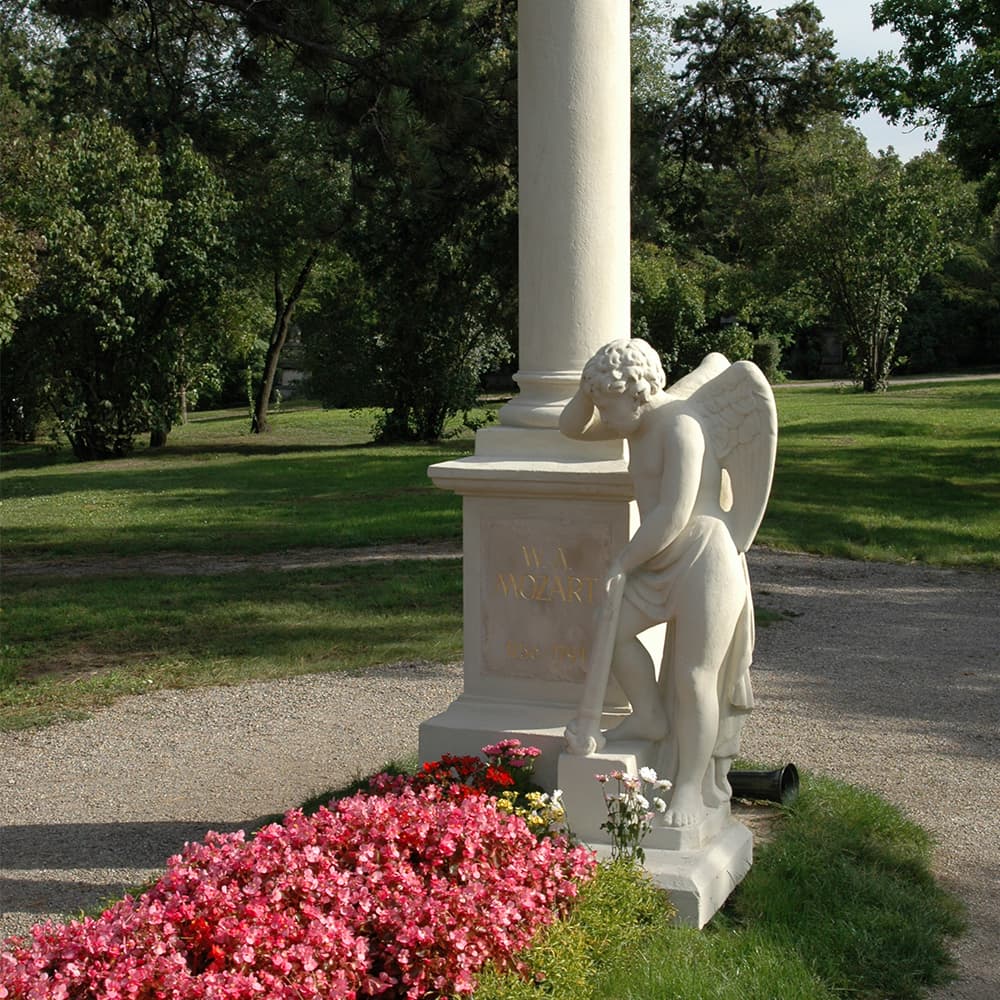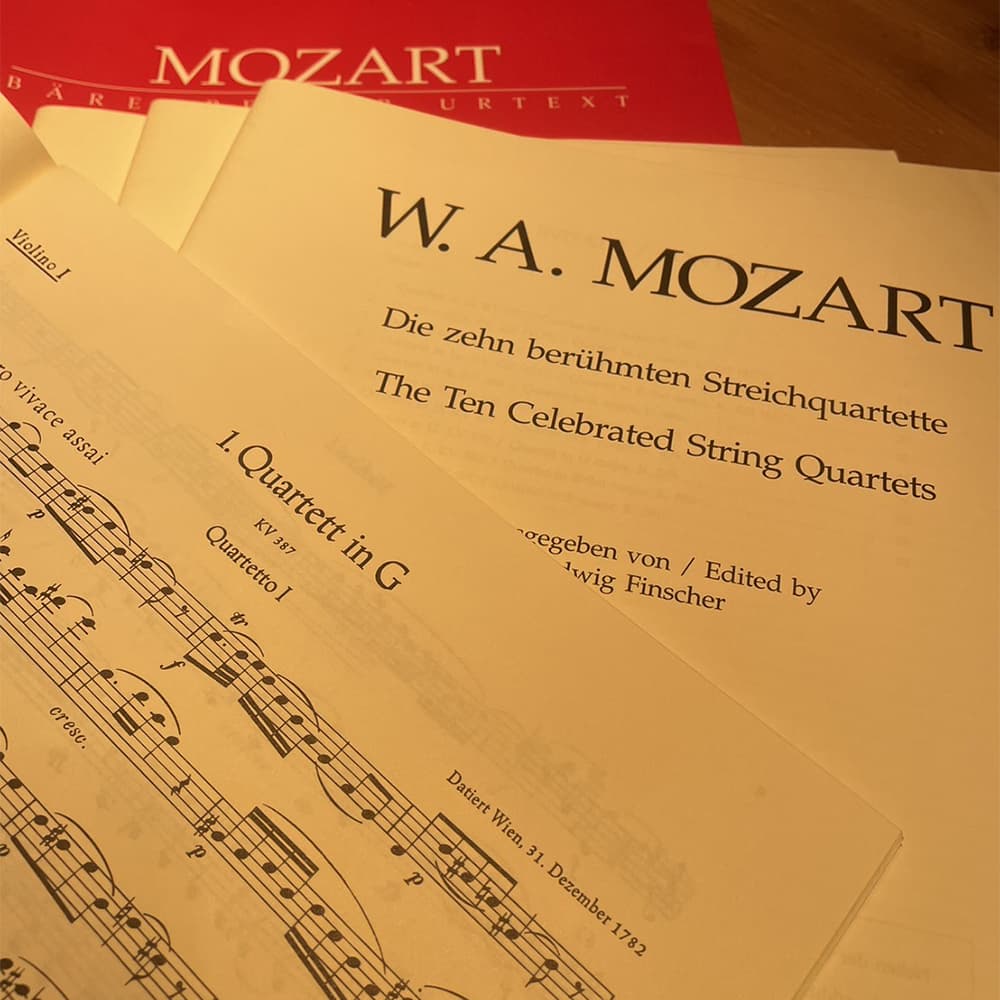モーツァルトは何が凄いのか?彼は、いったい何を成し遂げて、名声を得たのでしょうか。
Essay|2024.05.23
Photo_Kotaro Sakata
Text_Kotaro Sakata
1791年35歳の若さでこの世を去ったモーツァルトは、生涯に、あらゆる音楽ジャンルで700曲を超える作曲をし、未完のものを含むと900曲を超えます。5歳で交響曲を作曲し、8歳でオペラを作曲しました。パソコンもない時代に手書きで、室内楽、ピアノソナタ、膨大な交響曲やオペラの総譜に至るまで900曲であります。これを手書きで書き上げました。モーツァルト生誕250年のメモリアルイヤーの前に、ウィーン、生誕地のザルツブルクを徹底的に取材し、記念イヤーで、きれいに過去の遺産が隠されてしまう前にその足跡を探りました。まず、モーツァルトの直筆譜面を見ると、まるで、清書したかのようにきれいであり、ベートーベンのそれとは大違いで、モーツァルトは、曲を頭の中で出来あげ、スケッチから一気に書き上げたのが分かります。さらには、筆跡から察するに、縦に書いてあると思われ、各楽器のパート譜が、平行に並んでいる楽譜を縦に書いているのです。驚異的天才で、また、自身も、ヴァイオリン、トランペット、ピアノ(当時は、フォルテピアノかチェンバロ)をこなし、もし、現代のピアノ(88鍵)が当時存在していたら、もっとすごい作品を残していたことでしょう。
死後、遺体はウィーン郊外のサンクト・マルクス墓地の共同墓穴に埋葬されました。これは、当時としては、最低ランクの埋葬であり、共同埋葬という形式をとって、15人程の遺体を同じ墓穴に埋葬したという説もあります。埋葬時に列席者はいなく、いまだにモーツァルトの墓は不明であります。
そんな、天才モーツァルトのプライベートは、ギフテッドにありがちと言えば偏見になりますが、傍若無人であり、妻のコンスタンツェに迷惑をかけ、夜な夜な、共に天才台本作家で好色のダ・ポンテと遊び歩き、飲む、打つ、買う、し放題であったようです。私の調べでは、晩年の収入はウィーンで一番の外科医院長とほぼ同額で今の額で3,000~5,000万円ほどはあったことでしょう。なのに、ウィーンで最低ランクの葬式しか挙げられなかったというのは悲劇です。
晩年にモーツァルトは秘密結社『フリーメイソン』に入信し、そのプロパガンダとして、オペラ《魔笛》を書き、鎮魂曲『レクイエム』を作曲しております。彼の先人にも偉大な作曲家はいましたが、雇われの身からフリーに転身した最初の偉大な作曲家でありました。それは、短調の曲によく表されております。また、モーツァルトの明るい、聴きやすい曲調は、『眠れる、気持ちのよい曲』とされているらしいですが、その明るい曲調の中に秘めた恐ろしいまでの闇を見つけると、背筋がゾッとするほどにデモーニッシュであります。是非、この機会に、どんな曲でもいいので、モーツァルトで検索して聞いてみて、彼の心の闇を探してみてはいかがでしょうか。
What makes Mozart remarkable?
What did he achieve to earn his fame?
Mozart passed away in 1791 at the young age of 35, having composed over 700 works across various musical genres, and over 900 if you include his unfinished pieces. He composed a symphony at the age of five and an opera at the age of eight. In an era before computers, he wrote everything by hand—from chamber music and piano sonatas to vast symphonies and opera scores. Ahead of the 250th anniversary of Mozart’s birth, I conducted in-depth research in Vienna and his birthplace, Salzburg, to trace his footsteps before his legacy would get obscured during the memorial year. In stark contrast to Beethoven, Mozart’s original manuscripts appear as clean as if they were final copies, revealing that Mozart composed fully formed pieces in his head, progressing straight from concept to completion. He appears to have written the scores for individual instruments vertically, side by side on the sheet. A prodigious genius, he also mastered the violin, trumpet, and piano(which at the time would have been a fortepiano or harpsichord), and it’s speculated that had the modern piano with 88 keys existed then, he would have left even more impressive works.
After his death, Mozart was buried in a communal grave at St. Marx Cemetery on the outskirts of Vienna, which, at the time, was considered the lowest rank of burial, with up to 15 bodies possibly interred in the same grave. No one attended his burial, and to this day, the exact location of Mozart’s grave remains unknown.
Regarding his private life, Mozart was known for his reckless behavior, often causing distress for his wife Constanze. He often spent nights out with the talented and indulgent librettist Da Ponte, engaging in excessive drinking, gambling, and spending. Despite earning an income comparable to Vienna’s top surgeon—about 30 to 50 million yen in today’s terms—it is tragic that Mozart was only afforded the most basic funeral.
In his later years, Mozart became a member of the Freemasons and composed works like The Magic Flute and the Requiem, which reflected the society’s influences. Although there were notable composers before him, Mozart was the first major composer to transition from a salaried position to freelance, a transition that is in evidence in his minor-key pieces. While Mozart’s music is often described as soothing and pleasant, discovering the profound darkness hidden within his bright melodies can be a spine-tingling demonic experience. I encourage you to explore Mozart’s works and discover the darker parts of his heart.


a.ウィーン郊外の聖マルクス墓地内の路上にあるモーツァルトの墓石。しかし、ここに集団埋葬されているのではないか?ということで、決定的ではない。
b.モーツァルト作曲 10曲の弦楽四重奏曲集スコア(第14番~第23番)※筆者所有


